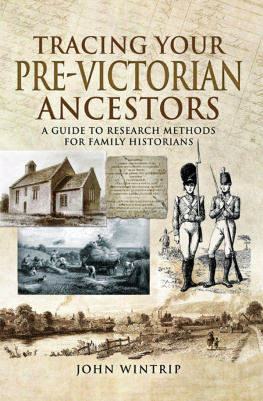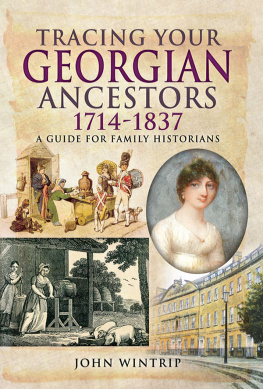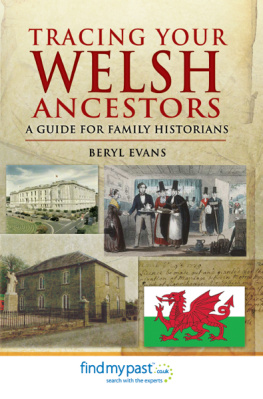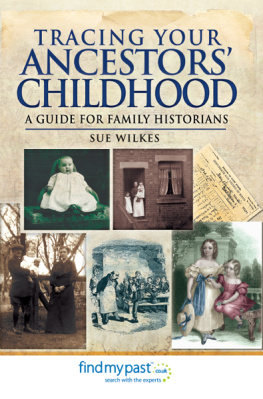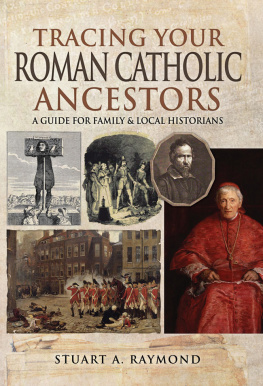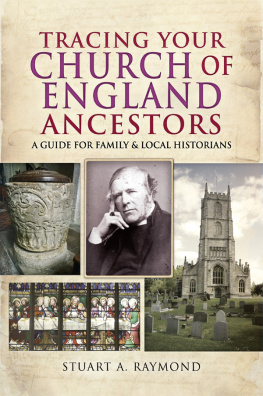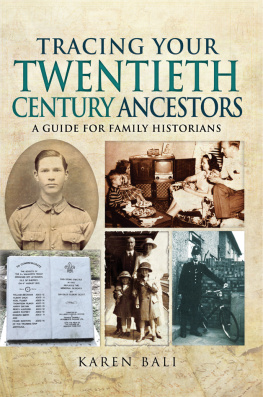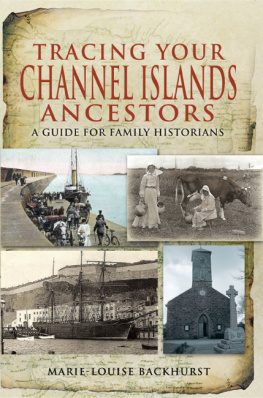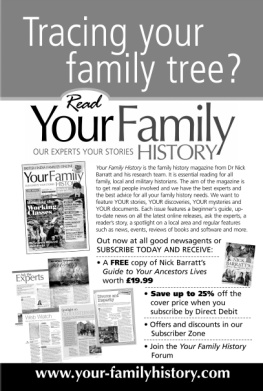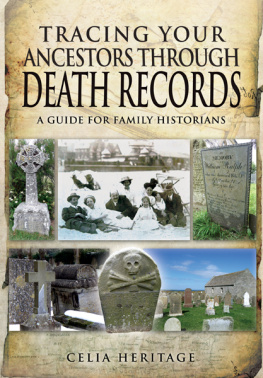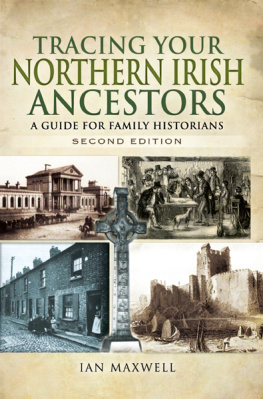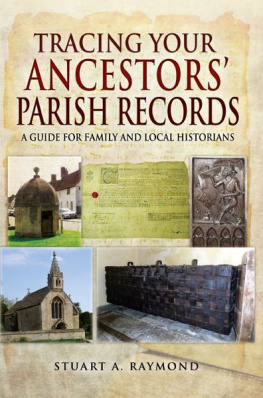
TRACING YOUR PRE-VICTORIAN ANCESTORS
A Guide to Research Methods for Family Historians
John Wintrip
First published in Great Britain in 2017
PEN & SWORD FAMILY HISTORY
an imprint of
Pen & Sword Books Ltd
47 Church Street,
Barnsley
South Yorkshire,
S70 2AS
Copyright John Wintrip, 2017
ISBN 978 1 47388 065 8
eISBN 978 1 47388 067 2
Mobi ISBN 978 1 47388 066 5
The right of John Wintrip to be identified as Author of the Work has been asserted by him in accordance with the Copyright, Designs and Patents Act 1988.
A CIP catalogue record for this book is available from the British Library.
All rights reserved. No part of this book may be reproduced or transmitted in any form or by any means, electronic or mechanical including photocopying, recording or by any information storage and retrieval system, without permission from the Publisher in writing.
Pen & Sword Books Ltd incorporates the imprints of Pen & Sword Archaeology, Atlas, Aviation, Battleground, Discovery, Family History, History, Maritime, Military, Naval, Politics, Railways, Select, Social History, Transport, True Crime, Claymore Press, Frontline Books, Leo Cooper, Praetorian Press, Remember When, Seaforth Publishing and Wharncliffe.
For a complete list of Pen & Sword titles please contact
PEN & SWORD BOOKS LTD
47 Church Street, Barnsley, South Yorkshire, S70 2AS, England
E-mail:
Website: www.pen-and-sword.co.uk
ACKNOWLEDGEMENTS
I would like to express my thanks to my wife Jessica for her support while I was writing this book, all my clients for providing me with the opportunity to research their ancestors, and the staff of the large number of archives throughout the country where I have carried out both personal and professional research over many years. I would also like to register my gratitude to Karina Williamson, Malcolm McEachran and Susan Moore for reading through drafts of the text and making valuable suggestions.
ABBREVIATIONS
The following abbreviations have been used throughout this book:
| GRO | General Register Office |
| LDS | Church of Jesus Christ of Latter-day Saints (Mormons) |
| SoG | Society of Genealogists |
| TNA | The National Archives |
INTRODUCTION
Civil registration was introduced in England and Wales on 1 July 1837. Queen Victoria had ascended the throne only a few days earlier on 20 June, so the period before civil registration can very conveniently be referred to as the pre-Victorian period. I have written this book to offer guidance to family historians tracing their English ancestors in the pre-Victorian period, when research becomes more challenging than after 1837 because church registers recorded less genealogical information than civil registration records and information on exact birthplace from census records is only available for those people who were still alive and living in Great Britain in 1851. The focus of this book is genealogical research in England, where most of my personal and professional research has been carried out, but the same principles are also applicable to Wales, as the systems of recordkeeping in the two countries were virtually identical.
Although this is a book for family historians, it is concerned with genealogy in the traditional sense of establishing relationships between generations, as it is essential to ensure that the correct individual or family has been identified before undertaking any wider investigation of family history. In any case the distinction between genealogy and family history in the pre-Victorian period becomes increasingly blurred as a result of the more limited range of sources available.
Genealogical research involves seeking previously unknown information about specific people, usually concerning the identity of their spouse or parents, and research on each ancestral line proceeds backwards in time in a sequence of logical steps. Some steps may be relatively straightforward, whereas others are difficult or impossible, and the term brick wall is often used to describe the latter category. A brick wall will eventually be encountered for each ancestral line, but some apparent brick walls are temporary obstacles that can be overcome through knowledge of relevant sources and the use of appropriate search tools and research techniques, as well as incorporating external background knowledge to interpret the information in those records that have been found and to identify further sources.
The classic work on genealogical research in England published during the twentieth century, still sometimes found on library shelves, was Genealogical Research in England and Wales, by Gardner and Smith, published in Salt Lake City in three volumes between 1956 and 1964. These volumes were written primarily to assist members of the LDS to research their English and Welsh ancestry at a time when genealogy still had a rather elitist image on this side of the Atlantic, where it was widely perceived as an esoteric and scholarly pursuit for the leisured classes rather than a leisure pursuit for the masses. Genealogy in the traditional sense of constructing pedigrees was only beginning to be transformed into family history as we now understand it, most parish registers were still held in churches, computers with far less processing power than smartphones filled whole rooms, and local family history societies were yet to be established. Nonetheless, the third volume in this set of books (Gardner and Smith, 1964) includes chapters on research procedures that are still relevant today.
Many books on genealogy have been published since the 1960s, but almost all have focused on sources. While still an amateur researcher I noticed that despite the plethora of books describing the sources in which I could potentially find information about my ancestors, very little information was included on how to do research, although Rogers (2008), first published in 1983, adopts a problem-solving approach, and many case studies illustrating sound genealogical research methods can be found scattered in books and magazine articles. I gradually came to the conclusion that this dearth of guidance was partly because genealogical research is far too complex to be reduced to a set of simple instructions, and partly because only a relatively small number of people, mainly professional genealogists with many years experience of carrying out research for clients with ancestors from a wide range of backgrounds, are likely to have the breadth of experience necessary to write books specifically on this topic.
The first book on genealogical research methods to be published for almost half a century appeared in 2012, written by professional genealogist Helen Osborn (Osborn, 2012). Genealogy: Essential Research Methods provides an excellent introduction, but I felt that a book for more advanced researchers focusing specifically on the period before civil registration was also needed. Not being aware of anyone else planning to write such a book I began contemplating doing so myself. Although I had not previously written any books for publication, during my earlier career as a librarian in universities I had written many explanatory guides for library users. While recognizing the impossibility of reducing genealogical research to a set of simple instructions, I thought it might still be possible to produce a useful book summarizing the most important principles and highlighting common errors. I began to make notes on topics I thought should be included, based on insights from my personal and professional research, taking into account the kind of background information I have included in reports for clients, questions clients have asked and unsound assumptions they have made, as well as errors I made myself as a novice researcher. My ideas for the contents of a book developed over several years, and when I approached Pen & Sword with my proposal they were keen for me to proceed.
Next page
